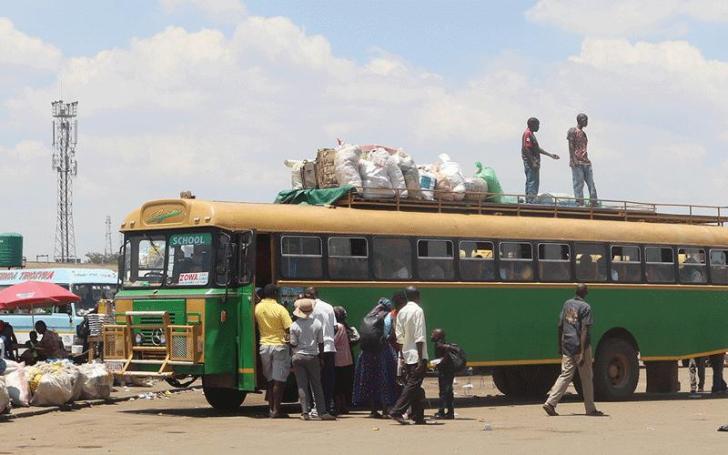News / National
Buses hike fares
24 Dec 2024 at 12:32hrs |
8 Views

Zimbabweans gearing up for festive holiday travel were left frustrated yesterday as transport operators hiked fares by over 50%, exploiting the surge in demand. This comes against the backdrop of a struggling economy, with the local currency, the Zimbabwe Gold (ZiG), continuing its steep depreciation on the parallel market.
At Harare's Mbare Musika bus terminus, fares doubled for popular routes. The cost of traveling to Marondera rose from US$3 to US$6, while a trip to Mutare surged from US$10 to US$20. Commuters heading to Chiredzi faced an increase from US$12 to US$25, and those traveling to Gweru saw fares climb from US$10 to US$15.
"I am appalled by the drastic increase in transport fares," lamented Mirriam Makamba, a distressed commuter. "Just recently, I was paying US$4 to travel to Marondera, but now it's US$6."
Many travelers expressed disappointment, with some reconsidering their holiday plans due to the unaffordable costs. "I wanted to go to Masvingo with my family, but the prices are just absurd," said one commuter.
Passenger Association of Zimbabwe president Tafadzwa Goliath explained that the fare hikes were driven by high demand, though not all operators had raised prices. He advised travelers to confirm fares with their preferred transport providers to avoid surprises.
The festive season unfolds as Zimbabwe grapples with a worsening economic environment. The ZiG, introduced in April at an exchange rate of US$1:ZiG13.6, was trading at ZiG25.76 per dollar by Friday—a 47% depreciation in less than a year.
This sharp decline has triggered soaring prices across the board. Basic goods such as cooking oil, sugar, and rice have seen significant price hikes, leaving many families unable to afford essentials.
"I don't even know what to do," said Mbare resident Allan Govera. "My salary in ZiG is no longer enough to buy food for my family."
In downtown Harare, where prices are exclusively pegged in US dollars, a 2-litre bottle of cooking oil that sold for US$3 last week now costs up to US$4. A 2-litre bottle of Mazoe Orange Crush, previously priced at US$4.50, has jumped to US$6. Clothes have also become more expensive, with jeans rising from around US$9 to as much as US$20.
Despite increased demand, the Grain Millers Association of Zimbabwe (GMAZ) assured that supplies of grain products such as maize meal and rice were sufficient, exceeding demand by 38.9%. GMAZ chairperson Tafadzwa Musarara said this had stabilized prices in formal retail outlets.
However, formal retailers reported a decline in sales volumes. "We used to close at 9pm during the festive season, but this year we're shutting down by 7pm due to low customer turnout," said a manager at a leading retailer.
The manager warned of possible retrenchments, citing the informal sector's growing dominance in the economy. "The informal sector has taken a huge chunk of our business, yet it doesn't pay taxes," they added.
As the festive season continues, many Zimbabweans face the harsh reality of balancing holiday cheer with an increasingly burdensome economic landscape.
At Harare's Mbare Musika bus terminus, fares doubled for popular routes. The cost of traveling to Marondera rose from US$3 to US$6, while a trip to Mutare surged from US$10 to US$20. Commuters heading to Chiredzi faced an increase from US$12 to US$25, and those traveling to Gweru saw fares climb from US$10 to US$15.
"I am appalled by the drastic increase in transport fares," lamented Mirriam Makamba, a distressed commuter. "Just recently, I was paying US$4 to travel to Marondera, but now it's US$6."
Many travelers expressed disappointment, with some reconsidering their holiday plans due to the unaffordable costs. "I wanted to go to Masvingo with my family, but the prices are just absurd," said one commuter.
Passenger Association of Zimbabwe president Tafadzwa Goliath explained that the fare hikes were driven by high demand, though not all operators had raised prices. He advised travelers to confirm fares with their preferred transport providers to avoid surprises.
The festive season unfolds as Zimbabwe grapples with a worsening economic environment. The ZiG, introduced in April at an exchange rate of US$1:ZiG13.6, was trading at ZiG25.76 per dollar by Friday—a 47% depreciation in less than a year.
This sharp decline has triggered soaring prices across the board. Basic goods such as cooking oil, sugar, and rice have seen significant price hikes, leaving many families unable to afford essentials.
"I don't even know what to do," said Mbare resident Allan Govera. "My salary in ZiG is no longer enough to buy food for my family."
In downtown Harare, where prices are exclusively pegged in US dollars, a 2-litre bottle of cooking oil that sold for US$3 last week now costs up to US$4. A 2-litre bottle of Mazoe Orange Crush, previously priced at US$4.50, has jumped to US$6. Clothes have also become more expensive, with jeans rising from around US$9 to as much as US$20.
Despite increased demand, the Grain Millers Association of Zimbabwe (GMAZ) assured that supplies of grain products such as maize meal and rice were sufficient, exceeding demand by 38.9%. GMAZ chairperson Tafadzwa Musarara said this had stabilized prices in formal retail outlets.
However, formal retailers reported a decline in sales volumes. "We used to close at 9pm during the festive season, but this year we're shutting down by 7pm due to low customer turnout," said a manager at a leading retailer.
The manager warned of possible retrenchments, citing the informal sector's growing dominance in the economy. "The informal sector has taken a huge chunk of our business, yet it doesn't pay taxes," they added.
As the festive season continues, many Zimbabweans face the harsh reality of balancing holiday cheer with an increasingly burdensome economic landscape.
Source - newsday
Join the discussion
Loading comments…




































